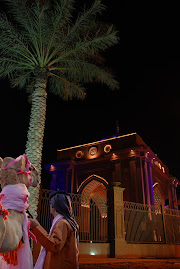
Dalia Mogahed, a Muslim-American woman appointed by President Obama to serve on his Advisory Council on Faith-Based and Neighbourhood Partnerships was in town last week with her research partner and equally renowned Professor John Esposito of Georgetown University.
Their visit to the UAE was part of a regional tour to present the findings of their six year survey of Muslims around the world. Last year, their book Who Speaks for Islam: What a Billion Muslims Really Think, was published in the United States, and their research is regarded as the largest survey of Muslim public opinion ever done.
And frankly, I couldn't have timed their visit any better; Last week, I wrote a column about how so-called "intellectuals" are capitalizing on American vulnerability and, sometimes, ignorance of Muslims, to sell sensationalist books. They use their unfortunate upbringing in extremist communities as a representation of their previous faith (Islam) and market themselves as the honorable dissedents who have freed themselves from the tyranny of a religion. Tyranny is un ugly thing, but a product of man rather than anything else. Most of these "intellectuals" don't seem to realize that they are just as extremist in their new beliefs as those they decry. Anyway, moving on to what this post is about.
Mrs Mogahed said the aim of their extensive study was to "democratize the debate" at a time when political pundits, and Islamophobes, even terrorists were speaking on behalf of Muslims, without actually knowing what Muslims wanted, believed or hoped for in life.
So the duo's research couldn't have come at a more critical time. With Obama's new moderate, public-diplomacy centric administration, the results of the survey will only further Obama's argument that our similarities are more marked than our differences.
I am not sure if the book is available in Abu Dhabi bookstores, but I got my copy from Kounikounya bookstore at The Dubai Mall. I also got it signed by Professor Esposito himself, at the June 10, 2009 Abu Dhabi leg of the tour. Yay!
Here's what came out of their talk:
Diversity downgrades political influence of US Muslims
By Tala Al RamahiABU DHABI // A lack of focus has prevented Muslim Americans from becoming a serious political force in that country, one of president Barack Obama’s advisers on Islamic issues said during a speech in Abu Dhabi.,
Dalia Mogahed, who advises president Obama on the attitudes and values of Muslims, said the American Muslim community had failed “in being a political power that Americans can take seriously” compared with other religious minorities in the United States. The reason, she said, was that the American political system “favours people who are very focused and organised, and Muslim Americans are neither of those things”.
She added that Muslim Americans are “very diverse”, that “makes it difficult for them to organise around one political platform”.
President Obama appointed Mrs Mogahed to serve on the Advisory Council on Faith-Based and Neighbourhood Partnerships. She is one of two Muslims on the 25-member council.
Mrs Mogahed, co-author of the book Who Speaks for Islam: What a Billion Muslims Really Think, was addressing about 200 people, including scholars and members of the public, at the Emirates Center for Strategic Studies and Research on Wednesday.
The book, is the product of a six-year study conducted by Mrs Mogahed and John Esposito, a professor of religion, international affairs and Islamic studies at Georgetown University in Washington, DC. Prof Esposito, the founding director of the Prince Alwaleed Bin Talal Center for Muslim-Christian Understanding,also spoke on Wednesday.
They interviewed more than 40,000 Muslims in 40 countries that are predominantly Muslim or have substantial Muslim populations in what is regarded as the largest study of Muslim public opinion ever.
Mrs Mogahed said the idea was to “inject into the conversation relating to the Muslims and the West the voices of ordinary people.
“We found that conflict between Muslims and the West is not inevitable. It is about policy and not a clash of principle.”
Prof Esposito said: “We don’t have to rely on experts or terrorists to tell us what Muslims want. We don’t have to rely on Islamophobes on what Muslims say, because now we have the data.”
Despite the perceived differences between Muslims and other Americans after the September 11 attacks in New York City, the research found that what Muslims and non-Muslims both admired most about the West was precisely the same: technology, liberty and democracy.
“Even in such an open-ended question, there is this large level of commonality between the two groups,” said Mrs Mogahed.
When we ask people of their dreams of the future, we didn’t hear about waging war. It was about finding jobs and seeking a good education for their children.”
The majority of Muslims surveyed also said they admired Western values such as freedom of speech, democracy and access to knowledge, with the caveat that Islamic values should not be compromised in the process.
Muslims were not interested in “Western culture wholesale”, Mrs Mogahed said of those surveyed, and consistently alluded to experiencing “a profound feeling of disrespect” from the United States.
Another study the two conducted asked Americans whether they believed the Western world respected Muslims. More than half (54 per cent) said no, and one-fifth reported “a great deal of prejudice towards Muslims.” Mrs Mogahed attributed such prejudices partly to the American media.
A study by Media Tenor, a media-content analysis firm, revealed that almost 53 per cent of those who represent Islam in American TV news were “armed groups”, even though such militants constituted “a fraction” of Muslims.
However, American people are also more likely to point out that “greater interaction between Muslims and the West is a benefit,” Mrs Mogahed said.
talramahi@thenational.ae


No comments:
Post a Comment